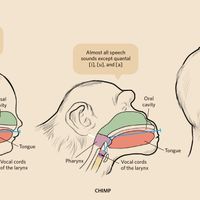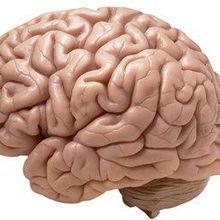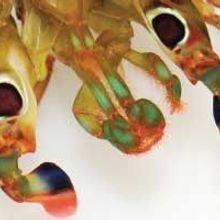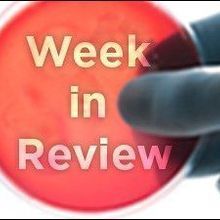Login
Subscribeneuroscience, evolution

Primer: Acoustics and Physiology of Human Speech
Philip Lieberman | Jun 30, 2018 | 2 min read
People have a unique anatomy that supports our ability to produce complex language.

New Caledonian Crows Build Tools From Mental Images, Not Lessons
Sukanya Charuchandra | Jun 29, 2018 | 2 min read
When it comes to tool making, the birds learn differently than humans.

Human-Specific Genes Implicated in Brain Size
Abby Olena, PhD | May 31, 2018 | 5 min read
Three members of a gene family called NOTCH2NL may have been involved in the evolution of humans’ big cortex.

Aging-Related Diseases May Be a Negative Outcome of Human Evolution
Sukanya Charuchandra | May 31, 2018 | 3 min read
Genetic adaptations for human brain development also make us vulnerable to Alzheimer’s disease, according to a new study.

What Made Human Brains So Big?
Ashley Yeager | May 24, 2018 | 2 min read
Ecological challenges such as finding food and creating fire may have led the organ to become abnormally large, a new computer model suggests.

Hibernating Rodents Feel Less Cold
Abby Olena, PhD | Dec 19, 2017 | 3 min read
Syrian hamsters and thirteen-lined ground squirrels are tolerant of chilly temperatures, thanks to amino acid changes in a cold-responsive ion channel.

Insects’ Neural Learning and Memory Center Discovered in Crustaceans
Catherine Offord | Dec 1, 2017 | 4 min read
Aggressive little marine predators, mantis shrimps possess a mushroom body that appears identical to the one found in insects.

How Poison Frogs Avoid Poisoning Themselves
Abby Olena, PhD | Sep 21, 2017 | 4 min read
Amphibians resist their own chemical defenses with amino acid modifications in the sequence for a target receptor.

Understanding the Roots of Human Musicality
Catherine Offord | Mar 1, 2017 | 10+ min read
Researchers are using multiple methods to study the origins of humans’ capacity to process and produce music, and there’s no shortage of debate about the results.

Birds Have Skills Previously Described as “Uniquely Human”
Jef Akst | Dec 1, 2016 | 3 min read
Scientists are enlisting the help of pigeons, parrots, crows, jays, and other species to disprove the notion that human cognitive abilities are beyond those of other animals.

Week in Review: September 5–9
Jef Akst | Sep 8, 2016 | 2 min read
Environmental magnetite in the human brain; prion structure takes shape; watching E. coli evolve in real time; learning from others’ behavior

What Lies Sleeping
Philippe Mourrain | Mar 1, 2016 | 4 min read
Why can science still not define this most basic biological process?

Contributors
Catherine Offord | Mar 1, 2016 | 3 min read
Meet some of the people featured in the March 2016 issue of The Scientist.

To Retain a Brain
Karen Zusi | Jan 1, 2016 | 4 min read
Exceptional neural fossil preservation helps answer questions about ancient arthropod evolution.

Capsule Reviews
Bob Grant | Dec 1, 2015 | 3 min read
Welcome to the Microbiome, The Paradox of Evolution, Newton's Apple, and Dawn of the Neuron.

Hear and Now
Mary Beth Aberlin | Sep 1, 2015 | 3 min read
Auditory research advances worth shouting about

Capsule Reviews
Bob Grant | Feb 1, 2015 | 3 min read
Touch, The Altruistic Brain, Is Shame Necessary?, and Future Arctic

Capsule Reviews
Bob Grant | Nov 1, 2014 | 3 min read
Leonardo's Brain, The Future of the Brain, Dodging Extinction, and Arrival of the Fittest

Contributors
Molly Sharlach | Nov 1, 2014 | 3 min read
Meet some of the people featured in the November 2014 issue of The Scientist.

Beyond Cat Killing
Bob Grant | Jul 31, 2014 | 1 min read
Capsule reviewed author Ian Leslie sets up his latest book, Curious, about the human propensity to wonder and learn.